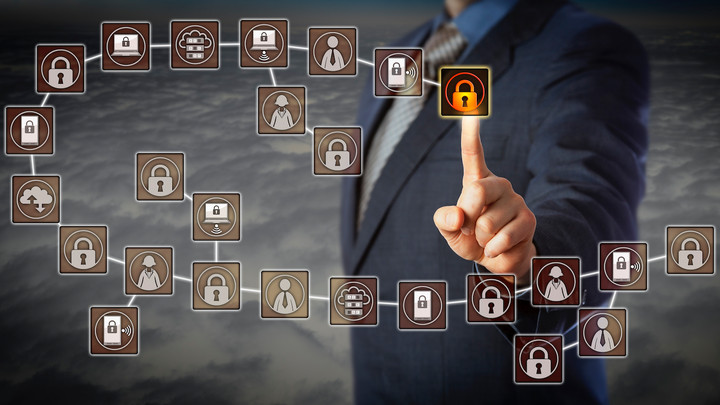How Could Digital Identities and Blockchain Make our Lives Easier?
Sebastian Beyer from CERTIVATION GmbH explains how digital identities and blockchain could make our lives easier.

© LeoWolfert | istockphoto.com
Many may find identity management boring. It is often seen as an administrative burden, especially when considering the requests of new ID cards or authentication requirements at the authorities. With the appearance of blockchain, this could change drastically. The emerging distributed-ledger technology could tear down administrative obstacles and speed up processes, all while increasing the security and protection of our personal data.
dotmagazine: Hi, Sebastian. First of all, what exactly are digital identities?
SEBASTIAN BEYER: Your digital identity describes you uniquely in the digital world. A simple example would be your Facebook profile. But they come in different forms and in varying degrees. Another example is the e-ID, which is a digital identity that was established in Estonia to digitize interactions with authorities, such as filing your tax report.
dot: Why are digital identities emerging these days?
BEYER: First off, digital identities are nothing new. There have been many initiatives in the past. Today, however, our activities in the digital world are a vital part of our daily lives. We share data on a daily basis, but do we know with whom? Do we still own our data? All these questions made people think about digital identities and their data.
dot: Can you give an example on the effects of those questions?
BEYER: Sure. First of all, digital identities help us to take back control of our personal data.
Second, it will make interactions – for example, with authorities – more frictionless. Imagine yourself moving to another city. You have to file lots of paperwork, inform many organizations, and you even have to wait at the municipality to hand in your paperwork to receive an updated ID card. With one trusted and secure digital identity, you could skip all these steps. Just change it in one place and automatically share it with those who should know – like in Estonia.
dot: What does blockchain have to do with this development?
BEYER: With the appearance of blockchain technology, digital identities are reaching the next level. With the previous approaches, identity theft and misuse were still an issue. With blockchain technology, it is possible not only to ensure the integrity of data and documents, but also to verify the identities of people and goods. In addition, the security and cryptography inherent in blockchain allow for the development of innovative identity standards while tracking access to your data.
With a blockchain application for identity management, users can decide for themselves which data is passed on and thus have a transparent overview of data collection and data processing.
In addition, the handling and checking of the security features of analog information such as certificates is not always quick and easy. As a result, blockchain services such as Blockchain Ensured Certificates have been developed that represent a digital identity and make data sharing faster, more secure, and tamper-resistant.
dot: Are there any other areas where blockchain can create benefits?
BEYER: Basically, there are numerous application possibilities for the blockchain. Nevertheless, some industries stand out. The logistics sector, in particular, but also areas where authenticity is important are ideal playing fields for the use of blockchain. A good example is certificate fraud during job applications, which is becoming a multi-million-dollar risk worldwide, as several studies indicate. People with fake certificates cause serious financial and reputational damage to companies every year. Another use case is automation of payroll for workforce providers. Payments can be automated after employees provide their timesheets, which will be checked automatically. If they are correct, the employees will receive their payments. On top of all that, the blockchain can function as a proof of record for the transactions.
dot: Are you following any of these use cases?
BEYER: We currently run a service to create tamper-proof company certificates such as ISO 27001 and personal certificates such as university degrees and training certificates using blockchain. We are also pursuing the goal of creating a sort of digital wallet, with all your application materials in one place.
dot: What would you recommend for starting a blockchain project?
BEYER: Despite all the enthusiasm that accompanies new technologies, a down-to-earth analysis of whether the use of a blockchain offers a concrete advantage is necessary when approaching each application scenario. There are several free-of-charge models available online that can be used to determine whether your situation could benefit from blockchain technology. Key elements are the relevance of trust, the number of parties involved, the need for transparency, and the need for an indisputable activity log.
In general, I recommend simply trying out blockchain technology and starting with a simple application. This is not expensive and only requires a bit of research. It is the only way to get a feel for the technology.
dot: Ok, and after I have identified a suitable use case? Then what comes next?
BEYER: The most important thing is to understand how blockchain technology works. You should take a bit of time, as this is the basis for a later project. It is also important to understand which blockchains are available and which fit your idea best. For example, a private blockchain can be the right choice when it comes to sensitive data.
You also need knowledge to program the interfaces that allow entry into the blockchain. In order to be able to implement our ideas quickly, we have taken advantage of the experience and support of an external service provider with a lot of prior experience in this area: Chainstep GmbH.
dot: Is the use of a blockchain free of charge?
BEYER: Ultimately, the transactions, i.e. the entry of a certificate in the blockchain, are not free of charge. As a rule, blockchain-based cryptocurrencies are used for payment. Fluctuating transaction costs of public blockchains present a particular risk. Companies that are dependent on constant costs for entering their data into the blockchain should avoid using a public blockchain.
dot: So blockchain will make our lives easier?
BEYER: It depends. Many people nowadays see blockchain as a solution for everything. This is not the case. In particular, the transparency of public blockchains can also be a problem. If sensitive or business-relevant data is to be shared, this should happen in a protected environment, and the user group should be clearly defined. In this case, a private blockchain might be suitable. The bottom line, though, is that if used with care, the blockchain could create valuable improvements in many industries and processes that could indeed make our lives easier.
Sebastian Beyer has been a product manager at CERTIVATION GmbH since mid-2017.
He has gained many years of experience in the areas of blockchain, service design, and strategy development, focusing on the implementation of innovative services, digital platforms, customer-oriented service models, and incubators. His first successful implementation of a blockchain service for certificate protection and validation for certification bodies and universities was completed in 2018. Mr. Beyer is also the author of numerous publications on the subject of blockchain.
Please note: The opinions expressed in Industry Insights published by dotmagazine are the author’s own and do not reflect the view of the publisher, eco – Association of the Internet Industry.





